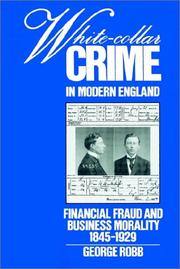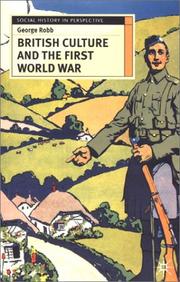| Listing 1 - 10 of 10 |
Sort by
|

ISBN: 052141234X 0521526124 0511522789 Year: 1992 Publisher: Cambridge : Cambridge university press,
Abstract | Keywords | Export | Availability | Bookmark
 Loading...
Loading...Choose an application
- Reference Manager
- EndNote
- RefWorks (Direct export to RefWorks)
In the period between the 1840s and the 1920s the British economy was transformed, from small-scale capitalism dominated by individual traders and partnerships to a complex financial structure dominated by large, joint-stock companies. The tremendous growth of big business created a world of new opportunities for criminal exploitation. The promotion and management of public companies and the trading of commercial securities proved vulnerable to the white-collar crimes of fraud and embezzlement. Problems of financial fraud were exacerbated by a climate of laissez-faire which championed the most permissive commercial legislation in the world, and white-collar crime wreaked havoc on the modern British economy. This new book examines the spread of white-collar crime from the Victorian period to the early twentieth century and offers a new perspective on modern scandals.
343.91-057.3 --- Commercial crimes --- -Commercial crimes --- -Securities fraud --- -343.53 <41> --- Stock fraud --- Fraud --- Corporate crime --- Crimes, Financial --- Financial crimes --- Offenses affecting the public trade --- Crime --- Witteboordcriminaliteit. White-collar criminaliteit --- History --- -History --- -Commerciele fraude. Industriele fraude. Ongeoorloofde concurrentie--Verenigd Koninkrijk van Groot-Brittannië en Noord-Ierland --- Securities fraud --- 343.53 <41> Commerciele fraude. Industriele fraude. Ongeoorloofde concurrentie--Verenigd Koninkrijk van Groot-Brittannië en Noord-Ierland --- Commerciele fraude. Industriele fraude. Ongeoorloofde concurrentie--Verenigd Koninkrijk van Groot-Brittannië en Noord-Ierland --- 343.91-057.3 Witteboordcriminaliteit. White-collar criminaliteit --- 343.53 <41> --- Arts and Humanities
Book
ISBN: 0252099745 9780252099748 9780252041174 9780252082719 Year: 2017 Publisher: Urbana : University of Illinois Press,
Abstract | Keywords | Export | Availability | Bookmark
 Loading...
Loading...Choose an application
- Reference Manager
- EndNote
- RefWorks (Direct export to RefWorks)
"Long overlooked in histories of finance, women played an essential role in areas such as banking and the stock market during the late nineteenth and early twentieth centuries. Yet their presence sparked ongoing controversy. Hetty Green's golden touch brought her millions, but she outraged critics with her rejection of domesticity. Progressives like Victoria Woodhull, meanwhile, saw financial acumen as more important for women than the vote. George Robb's pioneering study sheds a light on the financial methods, accomplishments, and careers of three generations of women. Plumbing sources from stock brokers' ledgers to media coverage, Robb reveals the many ways women invested their capital while exploring their differing sources of information, approaches to finance, interactions with markets, and levels of expertise. He also rediscovers the forgotten women bankers, brokers, and speculators who blazed new trails--and sparked public outcries over women's unsuitability for the predatory rough-and-tumble of market capitalism. Entertaining and vivid with details, Ladies of the Ticker sheds light on the trailblazers who transformed Wall Street into a place for women's work."--
Finance --- Women capitalists and financiers --- Women in finance --- Businesswomen --- Capitalists and financiers --- History. --- History --- E-books --- Political philosophy. Social philosophy --- Community organization --- Private finance --- Woodhull, Victoria --- Green, Hetty --- anno 1800-1899 --- anno 1900-1999 --- United States of America --- Finances --- Capitalism --- Participation --- Banking sector --- Book

ISBN: 0333715713 0333715721 Year: 2002 Publisher: Houndmills : Palgrave,
Abstract | Keywords | Export | Availability | Bookmark
 Loading...
Loading...Choose an application
- Reference Manager
- EndNote
- RefWorks (Direct export to RefWorks)
World War, 1914-1918 --- Literature and the war. --- Art and the war. --- Influence. --- Great Britain --- History --- Social conditions --- Civilization
Book
Year: 1992 Publisher: Cambridge New York Cambridge University Press
Abstract | Keywords | Export | Availability | Bookmark
 Loading...
Loading...Choose an application
- Reference Manager
- EndNote
- RefWorks (Direct export to RefWorks)
Book
ISBN: 033372562X Year: 1999 Publisher: Houndmills : Macmillan,
Abstract | Keywords | Export | Availability | Bookmark
 Loading...
Loading...Choose an application
- Reference Manager
- EndNote
- RefWorks (Direct export to RefWorks)
Book
ISBN: 9781137307491 Year: 2014 Publisher: New York ; Basingstoke Palgrave Macmillan
Abstract | Keywords | Export | Availability | Bookmark
 Loading...
Loading...Choose an application
- Reference Manager
- EndNote
- RefWorks (Direct export to RefWorks)
Book
Year: 1971 Publisher: Hinsdale (Ill.) : Dryden press,
Abstract | Keywords | Export | Availability | Bookmark
 Loading...
Loading...Choose an application
- Reference Manager
- EndNote
- RefWorks (Direct export to RefWorks)
Book
ISBN: 0030890047 Year: 1971 Publisher: Hinsdale (Ill.) Dryden
Abstract | Keywords | Export | Availability | Bookmark
 Loading...
Loading...Choose an application
- Reference Manager
- EndNote
- RefWorks (Direct export to RefWorks)
Book
Abstract | Keywords | Export | Availability | Bookmark
 Loading...
Loading...Choose an application
- Reference Manager
- EndNote
- RefWorks (Direct export to RefWorks)
Book
Year: 1931 Publisher: Leipzig Akademische verlagsgesellschaft M.B.H.
Abstract | Keywords | Export | Availability | Bookmark
 Loading...
Loading...Choose an application
- Reference Manager
- EndNote
- RefWorks (Direct export to RefWorks)
| Listing 1 - 10 of 10 |
Sort by
|

 Search
Search Feedback
Feedback About UniCat
About UniCat  Help
Help News
News